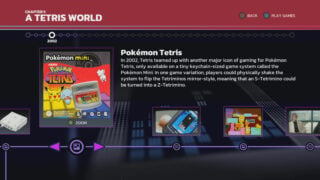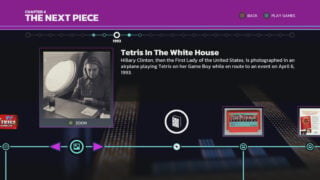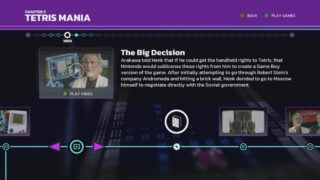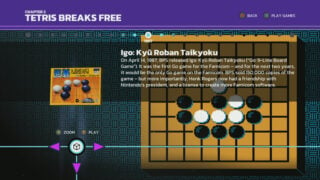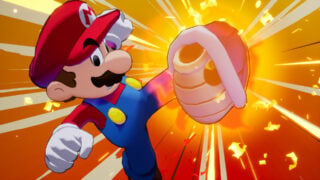Tetris Forever review: A masterful celebration of one of the medium’s most seminal series
Digital Eclipse’s third Gold Master Series entry is a near-perfect offering for Tetris fans
- Creative director
- Mike Mika
- Key Credits
- Chris Kohler (Editorial director), Jason Cirillo (Tetris Time Warp designer)
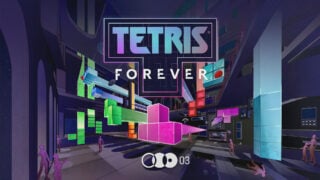
“Play Tetris, my friends.” It’s the quote that opens Digital Eclipse’s latest offering, and one that hits the feels right from the start for those aware of its history.
We outright refuse to believe that we have to explain Tetris to you, because with more than 202 million sales across its numerous versions it’s one of those rare games that have entered the public lexicon. People who have never touched a controller before know what Tetris is.
Not everyone knows its history, however, and even those who do may not be aware of the full story. Tetris Forever, the third game in Digital Eclipse’s exceptional Gold Master series, attempts to tell it in the ‘interactive museum’ format the studio has adopted over the past couple of years.
Given the state of the world in the mid ‘80s, with the Cold War nearing its end and US-Russia relationships thawing, the story of how the rights to Tetris were acquired is always a fascinating one every time it’s told.
It’s not often told to this level of detail, however, and with the key players providing their first-hand accounts. This time, with new and extensive interview videos with some of the major names including its creator Alexey Pajitnov and rights-hunter Henk Rogers, Digital Eclipse does a magnificent job of retelling a fascinating story.
The extensive video footage provided also includes older material, including the home movie of Rogers meeting Pajitnov in Russia, with Pajitnov uttering those immortal words to the camera “play Tetris, my friends” – a nice enough statement on paper, but also a touching one given the relationship between both countries at the time (hence the aforementioned feels, especially when you consider where the world is nearly 40 years later).
As in its previous interactive documentaries (Atari 50, The Making of Karateka and Llamasoft: The Jeff Minter Story), Tetris Forever presents a story told over a number of interactive timelines. Each of these covers a different chapter in the game’s life – its creation, the rights battle, its subsequent explosion in popularity, the variants and how it fits into modern technology.
The player follows each chapter’s timeline, checking out an enormous helping of high-quality images and video clips (both archival and newly recorded) along the way. And, crucially, when the timeline reaches certain games, you can play them in full.
There are 18 playable games in this collection, and the choice is an eclectic one. Not happy to simply chuck a bunch of ROMs onto an emulator and move on, Digital Eclipse’s attention to detail shows in the way it handled some of the games here. Most notable is its handling of Pajitnov’s very first version of Tetris, developed for the Soviet-designed Electronika 60 computer.
Programmer Jason Cirillo recently explained to us that emulation for the Electronika 60 is hardly widespread or reliable, so instead Digital Eclipse took the known footage of Pajitnov’s original version from previous documentaries about the game, and used that to reconstruct it from scratch, giving a near-perfect replica of a 1985 game running on a 1978 Soviet computer. It’s this level of dedication that’s hard to fault.
Other games on offer include other early versions of Tetris, as well as some of the variants like Hatris and numerous takes on Bombliss. Series devotees will be delighted by the inclusion of Tetris Battle Gaiden – the character-based multiplayer version of Tetris only ever released on the Super Famicom – along with numerous other Famicom, Super Famicom and Game Boy versions getting their first official western releases here. Where possible, games also include extremely high quality scans of their original manuals.
You even get Igo: Kyu Roban Taikyoku, the Famicom version of Go that Henk Rogers pitched to Nintendo’s then president Hiroshi Yamauchi. The game on its own is a fairly straightforward Go sim, but Digital Eclipse’s speciality is in the way it provides context, and once you’ve heard Henk Rogers’ brilliant anecdote about the deal he did with Yamauchi to get his Go game greenlit, it gives added importance to a game you may otherwise never have cared about, meaning you actually do want to play it.
“Digital Eclipse’s speciality is in the way it provides context, and once you’ve heard Henk Rogers’ brilliant anecdote about the deal he did with Yamauchi to get his Go game greenlit, it gives added importance to a game you may otherwise never have cared about, meaning you actually do want to play it.”
One of the 18 games is also unique in that it’s a completely new title created especially for this collection. Tetris Time Warp – which can be played solo or in multiplayer – starts off like a normal Tetris game (with infinite spin, piece holding and all the other stuff you’d expect from a modern take on the series). Occasionally though, one of the pieces will be glowing, and when you clear a line with it you’ll be sent back in time.
You may be sent back to the original Electronika 60 version, or a deliberately vague 1989 ‘handheld’ version, or a version of Bombliss. When this happens, you’ll be given a short time to clear a set task, be that clearing a set number of lines, clearing a double or exploding a large bomb. Succeed and you’ll be sent back to the modern day with a hefty points bonus. Fail and it’s not Game Over – you’ll just be sent back with nothing. It’s a fun new spin (pun always intended) on the classic.
There is one downside to Tetris Forever, and it’s a fairly obvious one. Because of rights issues (not least because it’s released on multiple formats), you won’t find any of the Nintendo-published versions of Tetris here. That means no Game Boy version, no NES version (at least not Nintendo’s one), and none of the other spin-offs it handled in the years that followed.
Thankfully, that doesn’t mean the topic of Nintendo is completely avoided altogether – far, far from it. It would be impossible to tell the story of Tetris without Nintendo’s involvement, so while none of its games are actually playable here, there are still reams of entries in the timelines discussing the development of the Game Boy and NES versions, as well as all the other spin-offs (even the Pokemon Mini version of Tetris gets a mention). No stone is left uncovered.
Indeed, the fact that Tetris Time Warp features a ‘handheld’ era, which to all intents and purposes is the Game Boy version completely recreated from scratch with very similar graphics and sound effects, shows just how adamant the studio was that those Nintendo versions shouldn’t be ignored.

Digital Eclipse has been knocking it out of the park recently with its retro offerings, and Tetris Forever is even further proof that it remains the best in town when it comes to the handling and presentation of classic software. As the third entry in the Gold Master series, it’s also the one that best nails that Goldilocks quest of balancing quality and quantity.
The first entry, The Making of Karateka, offered players an absolute wealth of content thanks to designer Jordan Mechner’s extensive collection of old behind-the-scenes material, but if you weren’t a fan of that specific game then the selection of titles, consisting mostly of prototype versions and ports of Karateka alongside a handful of Mechner’s earlier titles, may have underwhelmed slightly.
The second, Llamasoft: The Jeff Minter Story, had the opposite issue. With 42 of Minter’s games available to play there was no doubt of the variety on offer, though the fact Minter didn’t have such an obsessively sizeable collection of archive material means the documentary aspect didn’t dive quite as deep as the Karateka retrospective.

This time, Tetris Forever does its best to straddle the middle ground and pulls it off expertly. The 18 games on offer cover a good variety of early Tetris variants, and are certainly more than just the same base Tetris over and over again, while the extensive interviews with Pajitnov, Rogers et al and the numerous fantastic anecdotes make up for the lack of early design documents, providing players with a fascinating story, especially those who have never heard it before.
Along with Atari 50, Digital Eclipse has presented this timeline-based virtual documentary style to us four times now, and in no way, shape or form is it getting old – if anything, it feels like it’s just hitting its momentum. Such is the quality of Tetris Forever that it not only delivers a masterful tribute to one of the medium’s most seminal series, it also has us eagerly guessing what Gold Master Series 4 will be. Rest assured, we’ll be there on day one.
Tetris Forever review
Tetris Forever is an exceptional celebration of one of the most important series in video game history. Although factors outside of the developer's control means some of the most iconic versions of the game aren't available here, everything else – including the references to those games and one cheeky recreation – is handled with such attention to detail that this has to be considered the definitive telling of the Tetris story.
- A solid selection of 18 playable games
- Interactive museum format remains fantastically effective
- A wealth of entertaining and interesting interview footage
- Impressive recreation of the very first version of Tetris
- The iconic Nintendo-published versions aren't playable
